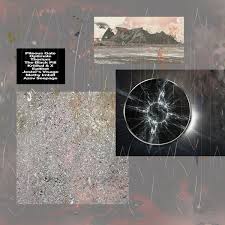Music doesn’t mean any harm, does it? I am a passive receiver. I haven’t done anything to anyone, I don’t deserve to be treated like this. Why is this happening to me? I sit here, click on the play symbol and suddenly I am engulfed in darkness, deep within someone else’s personal vision of their dystopian world translated into sound. I am stuck with them, unable to move from the spot, trapped inside the elevator with a madman as it plunges into the depths, and all the while there is this sound pummelling my head like it wants me dead. This is music someone has made and then delivered into my ears via a twelve-inch spiked syringe.
As Piteous Gate spins malevolently through its brief running time, it occurs to me that the only "nightclub" looming in my imagination is the cancerous bowel of a discotheque which opens Gaspar Noe’s Irreversible. The kind of club where the walls run thick and deep with mucus and stained sweat, the kind of club where your worst nightmares are picked up at the door and then fed upon by the other clientele. Piteous Gate is such an apposite title for this release, giving rise to notions of some communal passage through which human suffering can be bagged and mounted like a trophy.
As part of Berlin’s Janus Collective, M.E.S.H.’s work is very much on the hardest edges of club culture to such an extent that it becomes hard to discern any humanity at work here. The opening title track is a brief two-minute worm which thuds and bangs its way into your ear before manifesting itself as a ghastly throbbing vein inside your temples. ‘Optimate’ immediately follows with what sounds like a bouncing ball set loose to skip over a factory floor covered in shattered glass. It’s reminiscent of Autechre deliberating whether or not they wish to communicate anything to the outside world.
M.E.S.H.’s use of three-dimensional spatial dynamics come to the fore within ‘Thorium’, as laser flares and brittle rhythms engage harsh tactics as though drawing up battle lines for a hyper-futurist manifesto. Beats snap like breaking bones under branded training shoes and once again I find myself wondering why this music wants to rough me up so badly. ‘The Black Pill’ plays out like first-person shooter levels where all you do is wander around dispassionately observing horrendous acts of violence taking place just out of eye view while ‘Jester’s Visage’ conjures a neo-prog setpiece inside a medieval Cyber-King’s court.
These are the moments of respite. Elsewhere, ‘Kritikal & X’ sounds like a ball of evil gaseous ectoplasm floating through the cosmos looking to make friends but always coming across badly while ‘Epithet’ is a jam of feverishly transmitted signals trying to reach across waves of sickly static before the drums crunch and grasp with spasmodic reflexes at any living flesh within touching distance.
Listening to Piteous Gate is a bit like spending 31 minutes with a misunderstood and malfunctioning cyborg which keeps threatening to decapitate you as a friendly gesture. It’s also a pretty perfect soundtrack to the hellish contemporary urban experience which we’ve so gleefully created for ourselves. On ‘Azov Seepage’, as the beats clash and slice, tracers fire into virtual reality night skies and imaginary helicopters rumble relentlessly through our heads, it becomes clear that, yes, this music wants to do me harm. There is violence within this record and it is everywhere and all around me, inside me, hardwired into my being.
<div class="fb-comments" data-href="http://thequietus.com/articles/18353-m-e-s-h-piteous-gate-review” data-width="550">


